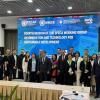News
Displaying Results 1 - 14 of 14
In recent years, the participating States of the United Nations Special Programme for the Economies of Central Asia (SPECA) - Afghanistan, Azerbaijan, Kazakhstan, Kyrgyzstan, Tajikistan, Turkmenistan, and Uzbekistan - have observed rapid growth in the number and impact of business incubators and…
With a long history of reliance on resource-based industries for growth, countries of the United Nations Special Programme for the Economies of Central Asia (SPECA) - Afghanistan, Azerbaijan, Kazakhstan, Kyrgyzstan, Tajikistan, Turkmenistan, and Uzbekistan - have embraced the power of innovation…
Many incidents in freight transport are attributed to poor practices in the packing of freight containers, including inadequate securing of cargo, overloading and incorrect declaration of contents. The victims of these incidents may be the general public or transport and supply chain workers, who…
Representatives from Kazakhstan, Kyrgyzstan, Tajikistan, and Uzbekistan met at the United Nations Economic Commission for Europe (UNECE) to discuss ways to unlock the resource potential and promote a sustainable future in Central Asia. The meeting was part of the UNECE Resource Management Week 2023…
During her recent two-day visit to Turkmenistan UNECE Executive Secretary Olga Algayerova spoke at international conference “Dialogue is a Guarantee of Peace” in Ashgabat and discussed areas of cooperation with the highest government officials, focusing on future circular, digital and green…
During its recent mission in Turkmenistan, a UNECE delegation presented a proposal for a new analytical project - “Trade and Innovation for Sustainable Development of Turkmenistan” - to the government and international stakeholders, aimed at supporting the country to enhance innovation governance…
UNECE and the QazTrade Center for Trade Policy Development are joining forces to advance sustainable trade and the circular economy in Kazakhstan. Kazakhstan is the first country in Central Asia to use the SPECA Principles of Sustainable Trade - a set of twenty principles, adopted by the countries…
SPECA countries are facing unique challenges, stemming from at least three crises: the need to deal with the regional and global repercussions of the COVID-19 pandemic, the political upheaval in Afghanistan, and the conflict in Ukraine. With the correct policies and mechanisms for subregional…
The Covid-19 pandemic continues to hit hard the countries of the United Nations Special Programme for the Economies of Central Asia (SPECA) and highlights the need to diversify from current, resource-dependent models of economic development. This will mean putting ‘innovation and technology that…
Countries in the UN Special Programme for the Economies of Central Asia (SPECA) are falling behind potential on many metrics of innovation performance. R&D spending remains below 1 per cent of GDP, almost entirely publicly funded, and SPECA countries rely extensively on natural resources,…
Transitioning towards a knowledge-based economy away from a resource-intensive model of economic growth is central for sustainable development among the seven countries of the UN Special Programme for the Economies of Central Asia (SPECA) - Afghanistan, Azerbaijan, Kazakhstan, Kyrgyzstan,…
Countries of Central Asia, the Caucasus and Eastern Europe have been hit hard by the socioeconomic impacts of the COVID-19 pandemic, which threatens to derail sustainable development progress in the region.
However, there is also a stronger momentum towards regional cooperation, and countries can…
With the COVID-19 pandemic, Trade facilitation has acquired even greater importance for the land-locked countries of Central Asia, as it helps remove burdensome formalities for their trade and transport operations. Simplifying and digitalizing procedures helps diminish physical contacts along…
A circular economy is a paradigm which can contribute to reducing the economic, environmental and social costs of resource use, while at the same time strengthening economic competitiveness, reducing poverty, and providing better quality of life, in line with the United Nations 2030 Agenda for…















